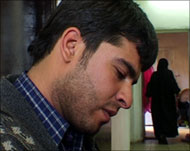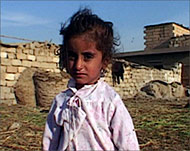United in grief and anger
On a sweltering farm in rural Baghdad Jabir Hasan prays on a mat in front of the family home. As planes roar overhead, he asks God for retribution.

Last year, a missile fell among his fields of wheat and summer vegetables. It did not harm anyone, not even one of the lazy cows sitting under the date palms. But a mile down the road another missile was falling.
It came down on top of a small farmhouse where Hasan’s son Adil, and two nephews, Muhammad and Yahia, were staying. The nephews were burned to a crisp but Adil made it to the hospital where he survived 24 hours and then died.
As the family cried over the caskets, another missile fell on the funeral.
“Body parts were flying everywhere,” says Jabir’s wife Umm Adil. “You couldn’t know the difference between a child and the flesh that was flying and the smoke. The caskets flew in the air and fell on the ground.”
Across town
On the other side of Baghdad in the crowded and poor Shia neighbourhood Shuala, Haidar Ghafil sits on the floor of his house printing out political pamphlets in support of cleric Muqtada al-Sadr, now wanted by the occupation authority which accuses him of supporting the murder of a rival cleric.
 |
|
Haidar’s life was also changed by |
Last year, a missile fell here too, on a crowded marketplace, killing 50 people, including Ghafil’s three younger brothers Ali, Muhammad and Husayn.
Ghafil scrapped his plans for marriage and enlarging the family home, and his carefree attitude was replaced by an interest in politics.
“I will never forget this,” he said at the time, sobbing angrily, his eyes fixed on the floor. “Our reaction will be known someday, it will be determined at that time.”
Shared loss
Today, Hasan, a Sunni, and Ghafil, a Shia, have something in common. They both want US forces to leave Iraq by any means possible.
Both say their resolve was not formed when they lost family members, but rather came to a head over time based on the actions of occupation forces over the past year.
Hasan’s family members have been imprisoned and suffer nightly house raids.
“Whenever their cars get burned, they surround the area and stay for four or five hours bombing,” says Umm Zena, Hasan’s daughter in law and widow of Adil, referring to the US-led occupation forces. “They don’t bomb anything specific, just out of fear of the people.
 |
|
Umm Zena: They even smell the |
“Then they come in the middle of the night and inspect the houses and personal things – the bedrooms, the kitchen – they even smell the perfume to check its scent.
“They don’t allow anyone to talk to them – they just tell us to get out of the house. And we and the children go, even the little ones who are sleeping.”
Good neighbour
Hasan’s brother, who lost two sons in US bombing, was detained by US forces during a house raid when he heard his neighbours shouting for help and came running to their home with a gun.
He disappeared into the US-run prison system and no one has seen him for six months.
Ghafil’s family also suffered the house raids, and has to contend with no electricity, a lack of clean water, and chronic unemployment.
Without the other sons to help, the family is scraping by, entirely reliant on Ghafil. His father developed a severe heart condition from the stress and is now bed-ridden.
Ghafil’s mother has concluded that America did not come to Iraq to help the people. “What help are they giving us?” she asks with tired eyes. “They are destroying us, not helping us.”
One year after the bombing of Baghdad, when they look at the pictures of their deceased relatives, Hasan, Ghafil and their families no longer cry. All their tears and sorrow have been transformed into a seething anger at the US.
“Now, I am in pain and everyone who lost something has this pain,” says Hasan. “And this pain is heading for America. It will come in a few days or months.”
Lost childhood
The granddaughter, four-year-old Zena, never laughs or smiles. Her face is permanently twisted into a sad grimace. She has learned to say: “Bush slaughtered Papa.”
 |
|
Zena has stopped smiling since |
“I tell her: Daddy went to paradise,” says her mother, flattening bread dough and sticking it inside a traditional clay oven.
“I tell her I will make it up to you. I will be your father and mother and big brother, I’ll be your everything. But she doesn’t accept it. She’s always asking about him. She talks to his picture asking him to come to her.
“Before, my life was sweet,” says Umm Zena. “There was no war and my husband was alive. What more could I have wanted? Now, all I see is fear. Fear and horror. There is no security.”
Political versus personal
Ghafil no longer dreams of marrying, as the family can not afford it. “I had many plans but now I’ve dropped them,” he says. Now, his focus is completely on the removal of the occupation.
“The Shia and Sunnis have to unify their resistance more; a joint plan is coming,” he says. “When that happens depends on the Americans. If they keep using more and more force against the people, they will push this to happen.”
|
“I am ready to sacrifice the rest of my family to defeat America. And God willing we will defeat her” Jabir Hasan, |
As tanks rumble by in the streets outside, Ghafil and his mother agree that peaceful demonstrations against the occupation are useless. “The US forces just shoot at them,” says Ghafil.
Across town on Hasan’s farm, helicopter gunships roar past the windows just feet away, rattling the glass in their frames.
“We will kick them out,” fumes Hasan. “With all my efforts, with everything I am capable of doing in this world, I am ready to sacrifice the rest of my family to defeat America. And God willing we will defeat her.”
“I will never forgive them,” says Umm Adil choking and pointing to her chest, “My son. And I forgive them? My country. And I forgive them? Our people all of them smashed. And I forgive them?
“Right now, we don’t have any freedom. Our people are demolished. What freedom remains for us? Our country is gone.”